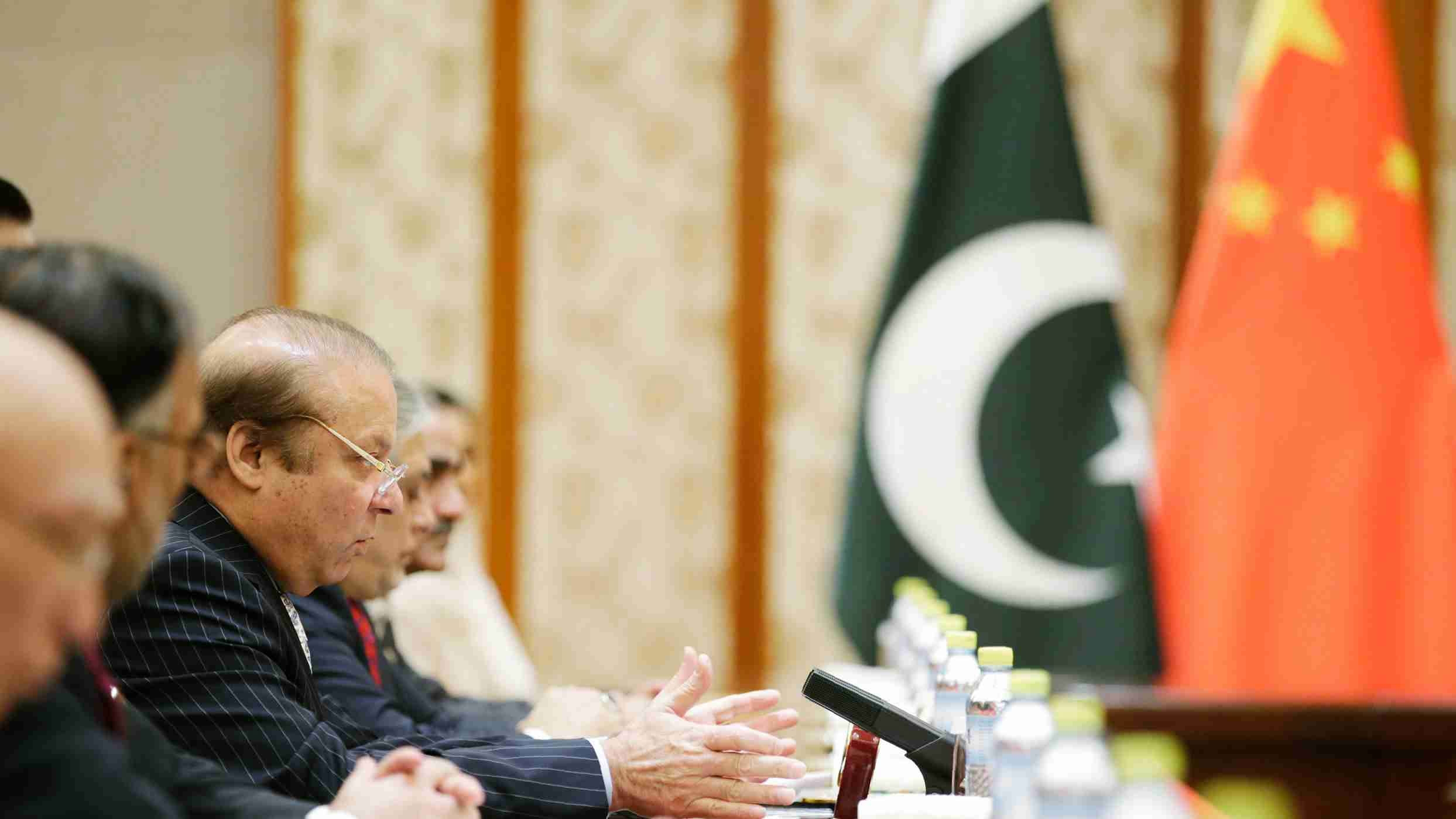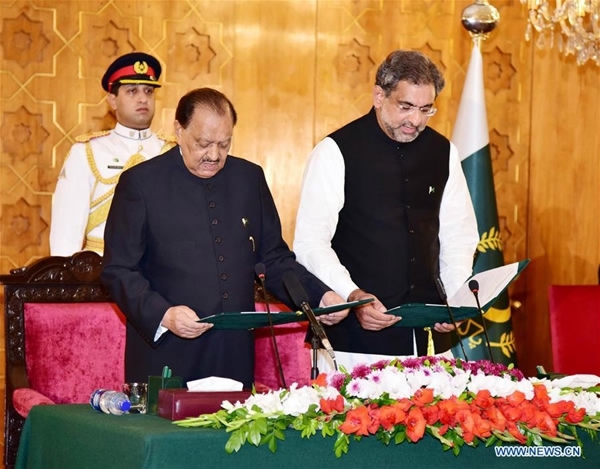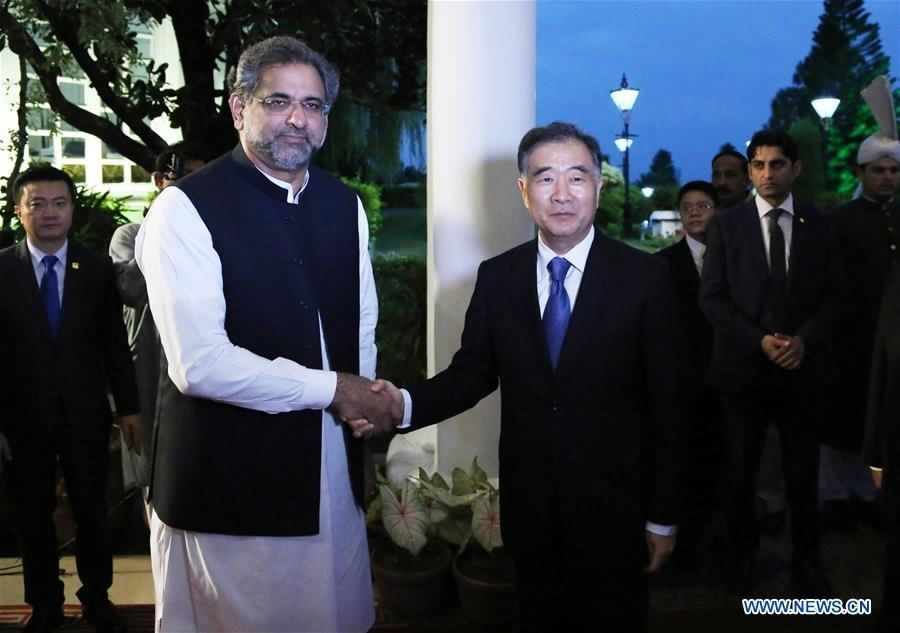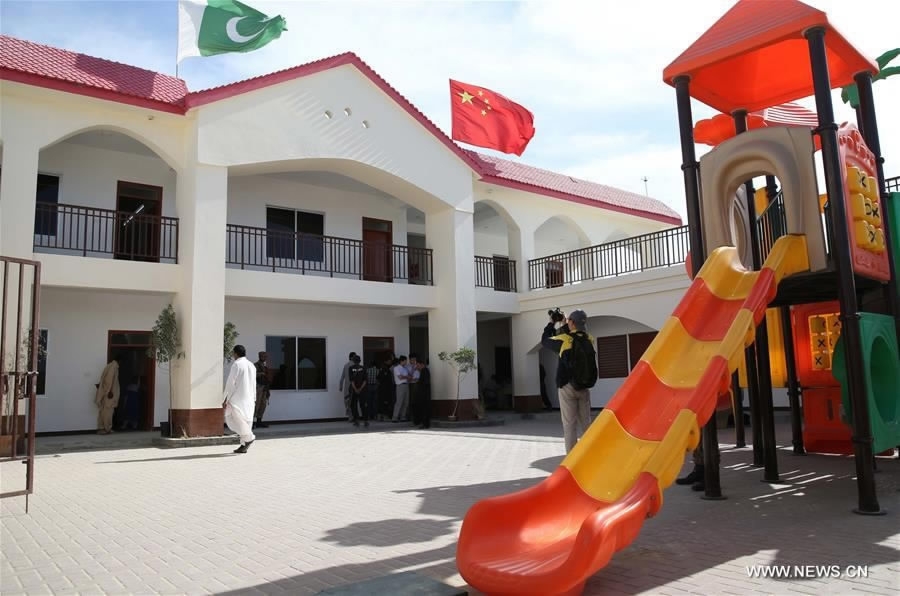
Opinions
12:33, 19-Aug-2017
Opinion: China and Pakistan relations after Sharif
By George N. Tzogopoulos from China.org.cn

The Belt and Road Initiative brings China closer to the world. Its objective to foster interconnectivity among different nations gradually becomes an issue of interest not only for directly involved stakeholders but also for outside observers endeavoring to assess the impact.
In that regard, China is gradually increasing its presence in several countries where it can be naturally affected by local developments. A current instance is Pakistan, where its outgoing prime minister, Nawaz Sharif, has handed over power to Shahid Khaqan Abbasi, a close ally.
As a matter of principle, China prefers political stability and continuity while investing abroad, but is also prepared to adjust to new developments. In the case of Pakistan there should be no real concern for a dramatic change.

Shahid Khaqan Abbasi (R) is sworn in by Pakistani President Mamnoon Hussain (L, front) as Pakistani 28th Prime Minister in Islamabad, capital of Pakistan, on Aug. 1, 2017. Shahid Khaqan Abbasi was sworn in as the 28th Pakistani Prime Minister Tuesday evening shortly after the parliament elected him with a clear majority. /Xinhua Photo
Shahid Khaqan Abbasi (R) is sworn in by Pakistani President Mamnoon Hussain (L, front) as Pakistani 28th Prime Minister in Islamabad, capital of Pakistan, on Aug. 1, 2017. Shahid Khaqan Abbasi was sworn in as the 28th Pakistani Prime Minister Tuesday evening shortly after the parliament elected him with a clear majority. /Xinhua Photo
Abbasi advocates harmonious relations with China. While being the minister for petroleum and natural resources, for instance, he publicly expressed his hope that Chinese oil and gas companies would invest in the energy sector, as well as other Pakistan business sectors.
And now, as premier, he is vowing to implement the China-Pakistan Economic Corridor (CPEC). Further to this, he decided to assign the Interior Ministry to Ahsan Iqbal, who had been head of a commission tasked with buildingthe CPEC.
In a meeting with the Chinese Ambassador to Pakistan Sun Weidong, he also talked about enhancement of bilateral relations beyond the CPEC. China has congratulated him on his elevation, convinced that a Pakistan government under his leadership "will continue to work towards maintaining national unity and stability and boosting economic and social development."
While Pakistan is heading for a 2018 general election, and it is not yet clear whether Abbasi will remain the leader of the Pakistan Muslim League-Nawaz (PML-N) party, Sino-Pakistani relations are evolving well to serve the interest of both countries.
The bilateral trade volume, for example, rose from about 4 billion US dollars a decade ago to 13.77 billion US dollars last year. China is also becoming the country's largest donor. During the first half of the current financial year it has provided 847.96 million US dollars.

Pakistani Prime Minister Shahid Khaqan Abbasi (front, L) meets with visiting Chinese Vice Premier Wang Yang (front, R) in Islamabad, Pakistan, August 13, 2017. /Xinhua Photo
Pakistani Prime Minister Shahid Khaqan Abbasi (front, L) meets with visiting Chinese Vice Premier Wang Yang (front, R) in Islamabad, Pakistan, August 13, 2017. /Xinhua Photo
Moreover, the realization of CPEC is now bringing about win-win results. China is thinking strategically and is in the process of creating new trade routes - principally with its investments in Pakistan's Gwadar port - to partly avoid some potential piracy problems at the Straits of Malacca as well as to reduce journey times.
A special report published by the Islamabad Institute of Conflict Resolution shows how many miles can be saved from central and western China to different world destinations via Pakistan in comparison to a totally sea-borne connection via Shanghai. According to the study, 7,580 miles would be saved to the Middle East and 6,873 miles to Europe. Moreover, China is systematically supporting the development and industrialization of the Xinjiang Uygur Autonomous Region to enhance the new routes.
As far as Pakistan is concerned, the CPEC critically contributes to its economic success. Currently, 19 projects worth over 18 billion US dollars are under construction, out of which 11 are related to the energy sector. That is because Pakistan is suffering from an energy crisis and is looking for practical ways to overcome it in a sustainable way.
A Deloitte analysis anticipates that 33 billion US dollars worth of energy infrastructure might be constructed by private consortia to help alleviate Pakistan's chronic energy shortages. These regularly amount to over 4,500MW and have contributed to an estimated shortfall of 2-2.5 percent off the country's annual GDP. Additionally, China is offering jobs to Pakistani citizens.
Ambassador Sun Weidong has talked about 60,000 local people being employed under the CPEC.

A China-donated primary school in Gwadar, Pakistan, March 22, 2017. /Xinhua Photo
A China-donated primary school in Gwadar, Pakistan, March 22, 2017. /Xinhua Photo
Obviously, mutual benefits of cooperation go beyond these lines. The attention, however, should also be turned towards existing challenges. Security concerns cannot be ignored. Attacks and kidnapping of Chinese nationals in areas such as Baluchistan are a negative influence.
Pakistan is one of the worst-hit countries in regard to terrorism and it is here where its new government has to concentrate in coordination with the international community.
Risks for China are evident; however, President Xi Jinping's vision is to support the Belt and Road Initiative in order for it to function as an umbrella of peace in the long-term. More time is obviously required to achieve this.
China is certainly helping Pakistan to achieve an equilibrium between stability, reform, prosperity and success. In so doing, it needs to improve its public image. People-to-people exchanges are thus significant. Cultural initiatives are equally playing a constructive role. The launch of Xi's The Governance of China book in Urdu is a positive step. Premier Abbasi and the new Pakistani government to be formed after the 2018 cannot but see China a long-term partner expanding areas and fields of bilateral collaboration.
(This piece was originally published in China.org.cn. The author is a columnist with China.org.cn.The article reflects the author's opinion, and not necessarily the views of CGTN.)
Source(s): China.org.cn

SITEMAP
Copyright © 2018 CGTN. Beijing ICP prepared NO.16065310-3
Copyright © 2018 CGTN. Beijing ICP prepared NO.16065310-3